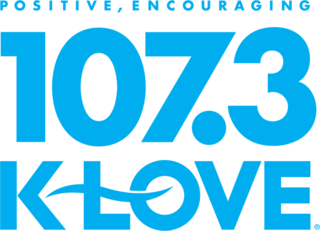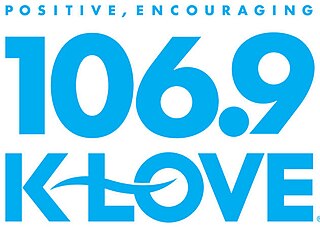
The University of the Philippines is a state university system in the Philippines. It is the country's national university, as mandated by Republic Act No. 9500, giving it institutional autonomy.
Educational Media Foundation is an American nonprofit Christian media ministry based in Franklin, Tennessee, a suburb of Nashville.
K-Love is an American Christian radio network. Owned by the Educational Media Foundation (EMF), a non-profit Christian ministry, it primarily broadcasts contemporary Christian music.

WLVW – branded as K-Love – is a non-commercial Christian adult contemporary radio station licensed to serve Washington, D.C. Owned and operated by the Educational Media Foundation, WLVW does not broadcast any local programming, functioning as the Washington metropolitan area network affiliate for K-Love. The station's transmitter resides in the district's northwest quadrant. In addition to a standard analog transmission, WLVW is available online; the station also broadcasts in the HD Radio format.

WKVP is a non-commercial radio station licensed to Camden, New Jersey, serving the Philadelphia media market. The station is owned and operated by Educational Media Foundation and is an affiliate of K-Love, EMF's Christian adult contemporary music network. Its broadcast tower is located on Mount Ephraim Avenue in Camden.
KFMK is an Austin, Texas radio station operating a contemporary Christian format as an affiliate of the K-Love radio network. It is licensed to Round Rock, Texas with an ERP of 4,500 watts from a transmitter site near West Lake Hills, and is currently owned by Educational Media Foundation.

Students for Free Culture, formerly known as FreeCulture.org, is an international student organization working to promote free culture ideals, such as cultural participation and access to information. It was inspired by the work of former Stanford, now Harvard, law professor Lawrence Lessig, who wrote the book Free Culture, and it frequently collaborates with other prominent free culture NGOs, including Creative Commons, the Electronic Frontier Foundation, and Public Knowledge. Students for Free Culture has over 30 chapters on college campuses around the world, and a history of grassroots activism.
KUFW is an FM radio station licensed to Kingsburg, California, serving the San Joaquin Valley, and owned by the Cesar Chavez Foundation. Formerly owned by the Educational Media Foundation (EMF) as an Air 1 station, it is now a member station of the Regional Mexican "La Campesina" network.

Barefoot Foundation is a Colombian charity founded by pop artist Shakira in 1997, with the aim of helping poor and impoverished children. The Barefoot Foundation mission statement is "The Barefoot Foundation works to ensure that every Colombian child can exercise their right to a quality education. Our model targets displaced and vulnerable communities by addressing their unique needs."
The Getty Foundation, based in Los Angeles, California at the Getty Center, awards grants for "the understanding and preservation of the visual arts". In the past, it funded the Getty Leadership Institute for "current and future museum leaders", which is now at Claremont Graduate University. Its budget for 2006–07 was $27.8 million. It is part of the J. Paul Getty Trust.

The Hamilton Institute is a multi-disciplinary research centre at Maynooth University, named after William Rowan Hamilton, the Irish mathematician, astronomer, and physicist.
The use of the Internet in Slovenia is widespread. According to official polls in the first quarter of 2008, 58% of citizens between the ages 10 and 74 were internet users, which is above Europe's average. In the same period, 59% of households and 97% of companies with 10 or more employed had internet access. In 2011, 73% of households had internet access, and 67% of households had broadband. As of 2011, 29% of Slovenians had never used the internet.

Alvin C. York Institute, also known as Alvin C. York Agricultural Institute or York Institute, is a public high school in Jamestown, Tennessee, founded as a private agricultural school in 1926 by World War I hero Alvin York and later transferred to the state of Tennessee in 1937, which continues to operate it as a public high school. It is the only comprehensive secondary school in the United States that is financed and operated by a state government.

Free content, libre content, libre information, or free information is any kind of creative work, such as a work of art, a book, a software program, or any other creative content for which there are very minimal copyright and other legal limitations on usage, modification and distribution. These are works or expressions which can be freely studied, applied, copied and modified by anyone for any purpose including, in some cases, commercial purposes. Free content encompasses all works in the public domain and also those copyrighted works whose licenses honor and uphold the definition of free cultural work.
Digital rights management (DRM) is the management of legal access to digital content. Various tools or technological protection measures (TPM), such as access control technologies, can restrict the use of proprietary hardware and copyrighted works. DRM technologies govern the use, modification and distribution of copyrighted works and of systems that enforce these policies within devices. DRM technologies include licensing agreements and encryption.
Internet censorship in Syria is extensive; with numerous websites and online platforms being banned for political reasons. Internet usage is authorized only through state-run servers and people accessing through other means are arrested. Filtering and blocking was found to be pervasive in the political and Internet tools areas, and selective in the social and conflict/security areas by the OpenNet Initiative in August 2009.
Joel Chadabe was an American composer and author. He is internationally recognized as a pioneer in the development of interactive music.

The idea and practise of providing free online access to journal articles began at least a decade before the term "open access" was formally coined. Computer scientists had been self-archiving in anonymous ftp archives since the 1970s and physicists had been self-archiving in arXiv since the 1990s. The Subversive Proposal to generalize the practice was posted in 1994.









